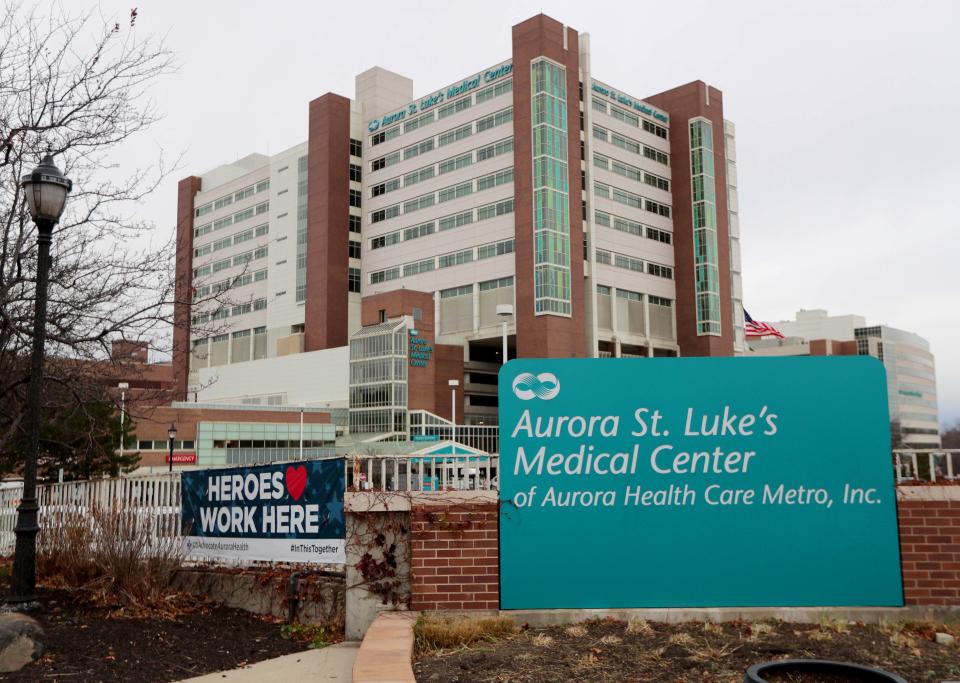Wisconsin hospitals are struggling even as COVID-19 wanes. Three CEOs explain why.

Nearly three years after hospitals and their workers found themselves on the frontlines of the coronavirus pandemic, Wisconsin hospitals are struggling to address both new and ongoing challenges.
Some are ripple effects of COVID-19, while others have emerged as surging inflation and seasonal illnesses pose new challenges.
They include worker shortages and staff burnout, an earlier than expected arrival of flu that's complicated by the presence of other respiratory diseases, and rising costs.
As health care systems work to find a way forward, three Wisconsin hospital CEOs recently offered their takes on the issues facing the industry at a recent panel discussion hosted in Milwaukee by Wisconsin Health News.
Here are four key takeaways from that discussion.
Staffing is the biggest challenge facing hospitals now
Hospital leaders said the biggest challenge is finding the workers they need and paying for them.
About 11% of registered nurse jobs at hospitals in Wisconsin were unfilled in 2021, a shortfall that has doubled since 2019, according to a survey of one in four hospitals by the Wisconsin Hospital Association. Other hospital jobs, including surgical techs, respiratory therapists and nursing aides, also had large jumps in openings, according to the survey results.
"It really hit us over the last 12 months," said Cathy Jacobson, president and CEO of Froedtert Health. "I think our workforce could have gotten through this if we had not had that last (COVID-19) wave a year ago. They just were exhausted and people started looking for − 'I'm out of health care. I'm going to go to someplace at least that can pay me some more money. I'm not going to work in a hospital anymore. I'm retiring.'"
Susan Turney, CEO of Marshfield Clinic Health System, which operates 11 hospitals primarily in rural, northern Wisconsin, said they try to offer competitive wages to workers, but even so it’s a challenge to be fully staffed.
"In most of our communities, there’s no one across the street to hire," she said.
Many health organizations have turned to hiring temporary workers through staffing agencies when unable to find nurses or other workers to fill openings, often at a much higher cost.
RELATED: Health care workers and other professionals continue to wait for Wisconsin licenses.
The “tripledemic” of COVID-19, the flu and RSV is stretching hospitals
The flu season has gotten off to a much earlier start than normal, taxing health care providers who also are treating patients with COVID-19 and respiratory syncytial virus.
The surge in respiratory illness has put a strain on hospital capacity as an influx of sick patients takes up hospital beds and results in longer wait-times at urgent care sites and emergency departments. Some hospitals in the state have resorted to rescheduling check-up visits and non-critical surgeries.
In Wisconsin, hospitalizations for the flu have been on the rise since mid-November. On Friday, about 330 people were in the hospital with confirmed cases, according to state-by-state data from the U.S. Department of Health and Human Services.
Peggy Troy, CEO of Children’s Wisconsin, said the last few weeks have been challenging, as more kids than usual were hospitalized with a respiratory illness.
"We were literally getting calls from other states for ICU beds, so it’s serious," she said.
In early November, over 50 children a day were hospitalized with RSV at Children’s Wisconsin’s in Wauwatosa. The number of kids in the hospital with RSV has since declined, Children’s Wisconsin reported in mid-December, but those hospitalized with the flu was rising.
In the week from Dec. 6 to 12, an average of about 56 children a day were hospitalized at Children's with a respiratory virus, including about 18 a day with the flu and about 21 a day with RSV, according to a press release.
RELATED: Flu season off to an aggressive start as doctors implore people to get vaccinated

Expect health systems to get bigger
This year has brought a string of announcements of hospital systems merging or acquiring other hospitals.
One of the latest deals was the merger this year of Advocate Aurora Health and Atrium Health to create the fifth-largest nonprofit health system in the nation. Now called Advocate Health, it will have a combined revenue of more than $27 billion.
Advocate Health will be headquartered in Charlotte, North Carolina, where Atrium is based.
Jacobson, the CEO of Froedtert, one of Aurora’s biggest competitors in Wisconsin, said health systems will continue to get bigger and enter into more joint ventures and other partnerships as health care evolves.
"We’re not going to stay small. We’re looking for growth," Jacobson said at the panel discussion.
Froedtert and ThedaCare recently formed a joint venture with plans to build joint campuses, including so-called micro-hospitals, in Oshkosh and Fond du Lac.
Froedtert Health also bought a majority stake in Holy Family Memorial Medical Centers in Manitowoc in 2021.
Other health systems in Wisconsin have also been looking to scale up.
In June, Green Bay-based Bellin Health announced plans to merge with Gundersen Health in La Crosse.
Marshfield Clinic Health System also recently began talks with Essentia Health, based in Duluth, Minn., over potentially combining.
Hospitals facing more financial strain following pandemic
The hospital CEOs said their organizations are facing more financial pressure than in past years, partly because of inflation and higher staffing costs from overtime pay and the cost of temporary staff hired through staffing agencies.
"Hospitals are losing money," Jacobson said.
Froedtert Health reported a net loss of $129.8 million in its fiscal year ended June 30, driven by realized and unrealized investment losses on the non-operating side of its finances, according to its most recent annual financial statement. That's compared with a net profit of $580.7 million the previous fiscal year.
When looking only at the operating side, Froedtert still turned an operating profit in the 2022 fiscal year, though the cost of salaries, benefits and supplies cut into that margin. The health system made an operating profit of $95.9 million, down from $221.9 million the previous year. Workforce costs make up over half of Froedtert's expenses, Jacobson said.
The pressures haven't eased. Froedtert reported a slight operating loss in the first quarter of the current fiscal year, according to its most recent quarterly filing.
"Cost of care has gone up," Turney, of Marshfield Clinic Health System, said. "The revenue side of it is not keeping pace with the rising cost."
This story has been updated with a correction to the number of children hospitalized with respiratory infections at Children's Wisconsin.
Our subscribers make this reporting possible. Please consider supporting local journalism by subscribing to the Journal Sentinel at jsonline.com/deal.
DOWNLOAD THE APP: Get the latest news, sports and more
This article originally appeared on Milwaukee Journal Sentinel: Why Wisconsin hospitals are struggling even as COVID-19 wanes

